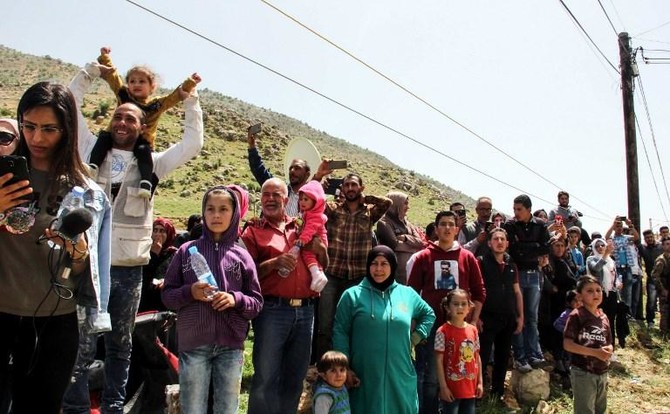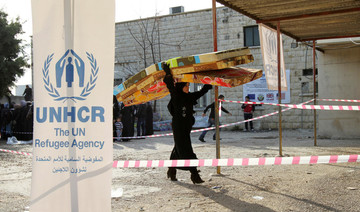BEIRUT: President Michel Aoun has said that Lebanon will continue to push for the return of Syrian refugees to their country.
“The return of the refugees cannot wait for a political solution to the Syrian crisis, which may take time and Lebanon’s situation can no longer support the refugees staying indefinitely on its land,” President Michel Aoun told representatives of the International Support Group for Lebanon.
The presidential media office said that President Aoun spoke to ambassadors of the international community about “losses to Lebanon amounting to nearly 10 billion dollars,” stressing that “Lebanon fulfills its obligations to the UN and friendly countries and is keen to maintain these strong relations, especially with the countries that help it.”
The president’s position follows the move by Foreign Minister Gebran Bassil to pressure the UN High Commissioner for Refugees (UNHCR), accusing it of obstructing the return of Syrian refugees to their country.
The foreign minister traveled to Geneva on Thursday and met with Commissioner-General for Refugees in Geneva, Filippo Grandi, and the UN envoy to Syria, Steffan de Mistura.
“No one should bet on a disagreement among the Lebanese because everyone agrees that those displaced should return to Syria,” Bassil said, stressing the readiness of the Foreign Ministry to “alter its actions against the commission if it notices a change in the adopted policy, but I am ready to increase it if there is no change.”
Basil added that “de Mistura knows that the return of displaced people to Syria is possible now and that return would accelerate a political solution to the crisis and reconciliation between the Syrians.”
Bassil traveled on Wednesday to the town of Arsal, on the Syrian border, for the first time since hosting the Syrian refugees following the outbreak of war in Syria in 2011. He toured Syrian refugee camps and met Lebanese residents.
Bassil told the town’s activists and representatives of the Syrian refugees, “The UNHCR does not allow us to complete the first phase of the return of Syrian refugees to their country and we are not talking about an immediate and forced return, but about phased and secure returns, with the assistance of the UN; we want the return of refugees and to provide assistance to them in Syria.”
Bassil noted, “The people of southern Lebanon set up tents near their destroyed homes after the July 2006 war in preparation for the reconstruction, and the Syrian people can do the same.”
“Our economic situation can no longer afford the burdens of displacement. We do not want any conflict with the UNHCR, but it is time to tell them enough is enough and nothing is greater than Lebanon’s interest,” he said.
The crisis between the foreign minister and the UNHCR was not marked by government solidarity with Bassil. Prime Minister-designate Saad Hariri met Lazarini and the UNHCR representative in Lebanon, Mirai Gerard, on Tuesday. “We and the United Nations are partners in our assistance to address the refugee issue,” Hariri said, “and the final solution for refugees, for us as well as for them, is their return to Syria.”
Bassil made a decision a few days ago to freeze the residency permits of foreigners working in the UNHCR office in Beirut in protest against UNHCR representatives’ inquiries to those wishing to return to Syria, which “made refugees hesitate to return,” according to the Lebanese foreign minister.
“The measures I have taken against the UNHCR are within my authority and I can be tougher, but I will discuss the matter with UN officials in Geneva on Thursday; international organizations must respect our policies,” he said.
The UNHCR preferred not to comment on Bassil’s visit to Arsal.
UNHCR spokeswoman Lisa Abu Khaled told Arab News: “There are 40,000 registered refugees in Arsal, and perhaps the figure is even higher because there are those who have not registered with UNHCR. Those who want to return to Syria and need help may benefit from our assistance if they are in an area that can be reached by UNHCR representatives. In Lebanon, the refugees are living under difficult conditions and they are benefiting from cash assistance. We told them that they would continue to receive the assistance for two months after their return, and then they may benefit from any existing programs in Syria.”
The head of the Syrian Refugees Committee representing those wishing to return to the Qalamun area, Talib Abdul Aziz, who accompanied Bassil’s tour in Arsal, told Arab News: “There are 3,193 Syrian refugees who have registered since early April to return to their towns in Syria as part of the reconciliation program being carried out by the Syrian authorities. And we are still waiting for the approval of the return; we are told that it is the responsibility of the Lebanese public security now, and we are waiting for logistical arrangements to organize the return convoy, which may take place after Eid Al-Fitr.”
Aziz said that “193 registered people had not waited for the convoy but had crossed the Lebanese-Syrian border to Syria and said they didn’t need the reconciliation committee.”
“The remaining refugees want to return with their livestock, cars and belongings, and they want their return to be through the barrens leading to their villages. The Syrian state has agreed to let us take our cars and our necessities with us, and so has the Lebanese General Security,” he said.
Abdul Aziz is from the Syrian town of Flitah and is a member of the chamber of commerce in Damascus. He went to Arsal with his family in 2013.
“The return to Qalamoun is now possible after the terrorist gunmen fled Arsal barrens and crossing these barrens has become possible,” he said. “The distance to Qalamoun is only 27 kilometers. The Lebanese General Security has offered to provide buses to transport us but we said that we want to use our cars and trucks that we used when we fled when the war reached our homes.”
However, the return convoys will not include the displaced people from the town of Qusayr, who fled from their town when Hezbollah gunmen entered it to expel the armed opposition, which mostly included the Free Syrian Army.
Khaled Raad, who fled Qusayr with his family to Arsal in 2013 when the town fell into the hands of Hezbollah, said: “There are 40,000 displaced people from Al-Qusayr in Lebanon, and they cannot go back now as part of a reconciliation with the Syrian regime. The neighborhoods of our town are totally destroyed and lifeless. The eastern neighborhood is the only one still undamaged. It is not true that the rest of the neighborhoods are still intact as they claim. Those who are now returning to their town in Western Qalamun have family support there, but we do not have such support and cannot return to destruction. It is still early to talk about the return.”
Raad said that Foreign Minister Bassil had proposed that: “We return to Qusayr and put up tents, but we said we want them away from Qusayr and with guarantees. There is a crisis of trust between us and the Syrian regime, not just misunderstanding.”
Sarah Kayali, a Syrian researcher with the Middle East and North Africa Division of Human Rights Watch, told Arab News: “Lebanon is committed to the provisions of the Convention for the Protection of Refugees, even if it did not sign it, and the most important item is not to return refugees to areas where they may be at risk.”
“The move for the return of refugees is noted in Jordan and Turkey as in Lebanon,” Kayali said, adding that “pressure on the refugees leaves them with only the option of returning.”
























